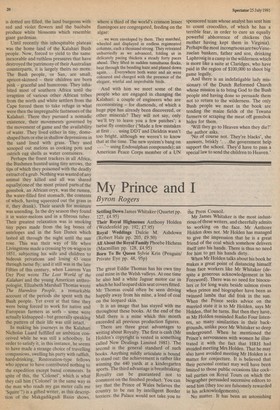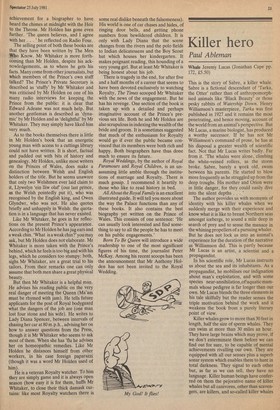My Prince and I
Byron Rogers
Settling Down James Whitaker (Quartet pp. 127, £4.95) Their Royal Highnesses Anthony Holden (Weidenfeld pp. 192, £7.95) Royal Weddings Dulcie M. Ashdown (Robert Hale pp. 203, £9.50) All About the Royal Family Phoebe Hichens (Macmillan pp. 128, £4.95) Born To Be Queen Sylvie Krin (Penguin/ Private Eye pp. 48, 95p) The great Eddie Thomas has his own tiny coal mine in the Welsh valleys. At one time he also had a white Jaguar motor car in which he had leopard skin seat covers fitted. Mr Thomas could often be seen driving happily away from his mine, a load of coal on the leopard skin.
It is an image that has stayed with me throughout these books. At the end of the Mall there is a mine which this month exceeded all previous production figures.
There are three great advantages to writing about Royalty. The first is cash (Mr Holden's copyright is vested in something called New Dealings Limited .1981). The second is the general standard of such books. Anything mildly articulate is bound to stand out: the achievement is rather like winning the 440 yards at a kindergarten sports. The third advantage is breathtaking: Royalty can be guaranteed not to comment on the finished product. You can say that the Prince of Wales believes the country to be run by intelligent Border terriers: the Palace would not take you to the Press Council.
Mr James Whitaker is the most industrious of these writers, and cheerfully admits to working on the face. Mr Anthony Holden does not. Mr Holden has managed to give the impression that he is a great friend of the coal which somehow delivers itself into his hands. There is thus no need for him to get his hands dirty.
When Mr Holden talks about his book he makes a great point of distancing himself from face workers like Mr Whitaker (despite a generous acknowledgement in his Foreword). There was no need for binoculars or for long waits beside salmon rivers when prince and biographer have been as twinned lambs that did frisk in the sun. When the Prince seeks advice on the married state it is to Mr Holden, says Mr Holden, that he turns. But then they have, as Mr Holden reminded Radio Four listeners, so many similarities in their backgrounds, unlike poor Mr Whitaker so deep underground. When he mentioned the Prince's nervousness with women he illustrated it with the fact that HRH had avoided meeting Mrs Holden. That he may also have avoided meeting Mr Holden is a matter for conjecture. It is believed that their personal contact may well have been limited to those public occasions like cocktail parties on Royal Tours on which the biographer persuaded successive editors to send him (they too are fulsomely rewarded in his acknowledgements).
No matter. It has been an astonishing
achievement for a biographer to have heard the chimes at midnight with the Heir to the Throne. Mr Holden has gone even further. 'The queen believes, and I agree with her. . . 'he reflected on Radio Four.
The selling point of both these books are that they have been written by The Men Ntio Know. Mr Whitaker is more forthcoming than Mr Holden, despite his acknowledgements, as to where he gets his facts. Many come from other journalists, but which members of the Prince's own staff talked? The Prince's Private Secretary is described as `stuffy' by Mr Whitaker and was criticised by Mr Holden on one of his many radio interviews for keeping the Prince from the public: it is clear that Edward Adeane was not much help. But another gentleman is described as 'dynamic' by Mr Holden and as 'delightful' by Mr Whitaker. They may simply have liked him very much.
As to the books themselves there is little in Mr Holden's book that an energetic young man with access to a cuttings library could not have written. It is short, factual and padded out with bits of history and genealogy. Mr Holden, unlike most writers on the Princes of Wales, does make a distinction between Welsh and English holders of the title. But he seems unaware that only two Welshmen ever laid claim to it, Llywelyn 'em n lliw old' (our last prince, as the Welsh pointedly put it), who was recognised by the English king, and Owen Glyndwr, who was not. He also quotes briefly and unhappily in Welsh: the quotation is in a language that has never existed.
Like Mr Whitaker, he goes in for reflections on the present Prince's appearance. According to Mr Holden he has jug ears and a weak chin. 'What is a weak chin?' you may ask, but Mr Holden does notelaborate. Mr Whitaker is more taken with the Prince's behind, which he feels is too big and with his legs, which he considers too stumpy: both, sighs Mr Whitaker, are a great trial to his tailors. From their remarks one can only assume that both men share a great physical beauty.
But then Mr Whitaker is a helpful man. He advises his reading public on the very real danger of meeting the Queen (Ma'am must be rhymed with jam). He tells future applicants for the post of Royal bodyguard what the dangers of the job are (one man lost four stone and his wife). He writes to Lady Diana Spencer, between intervals of chasing her car at 80 m.p.h., advising her on how to answer questions from the Press, though it is Mr Whitaker who seems to ask most of them. When she has 'flu he advises her on homeopathic remedies. Like Mr Holden he distances himself from other workers, in his case foreign paparazzi (though it was a word Mr Holden used of him). He is a veteran Royalty watcher. To him they are simply game and it is always open season (how easy it is for them, huffs Mr Whitaker, to close their thick damask curtains: like most Royalty watchers there is some real dislike beneath the fulsomeness). His world is one of car chases and hides, of ringing door bells, and getting phone numbers from bewildered children. It is only with Lady Diana that the scene changes from the rivers and the polo fields to Indian delicatessens and the Boy Scout hut which houses her kindergarten. It makes poignant reading, this hounding of a very young girl. But at least Mr Whitaker is being honest about his job.
There is tragedy in the end, for after five and a half months of a career that seems to have been devoted exclusively to watching Royalty, The Times scooped Mr Whitaker with the news of the engagement. But he has his revenge. One section of the book is taken up with a detailed and perhaps imaginative account of the Prince's previous sex life. Both he and Mr Holden are also scrupulous in indexing the wealth of the bride and groom. It is sometimes suggested that much of the enthusiasm for Royalty would go if ever the public became convinced that its members were both rich and happy. Both biographers have thus done much to ensure its future.
Royal Weddings, by the author of Royal Paramours and Royal Children, is an unassuming little amble through the institutions of marriage and Royalty. There is much gossip. I recommend it heartily to those who like to read history in bed.
All About the Royal Family is an excellent illustrated guide. It will tell you more about the way the Palace functions than any of these books. It also contains the best biography yet written on the Prince of Wales. This consists of one sentence: 'He can usually look interested and find something to say to all the people he has to meet on his public engagements.'
Born To Be Queen will introduce a wide readership to one of the most significant figures of his time, the journalist Peter McKay. Among his recent scoops has been the announcement that Mr Anthony Holden has not been invited to the Royal Wedding.



































 Previous page
Previous page